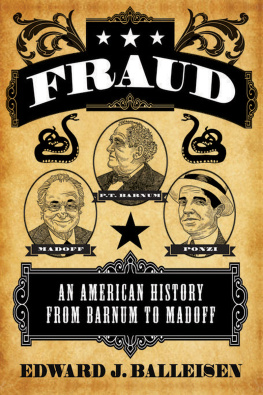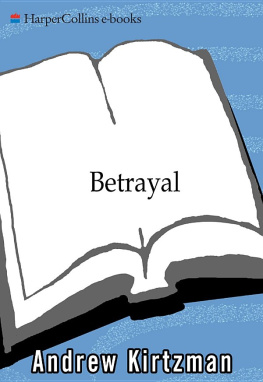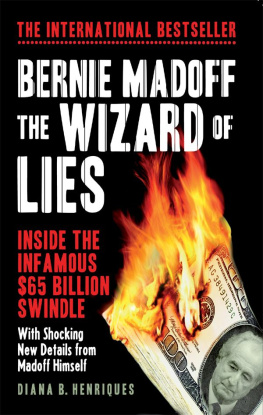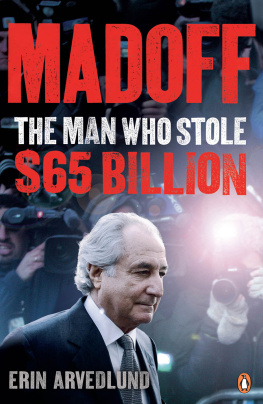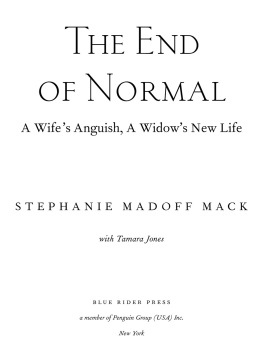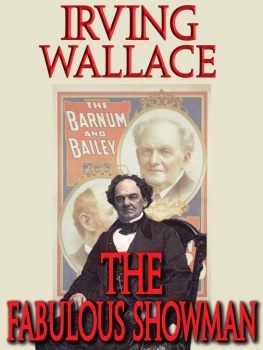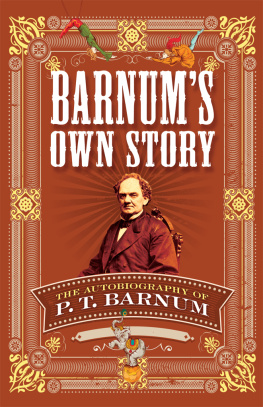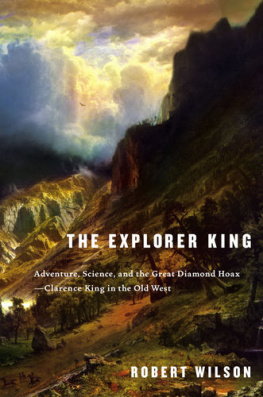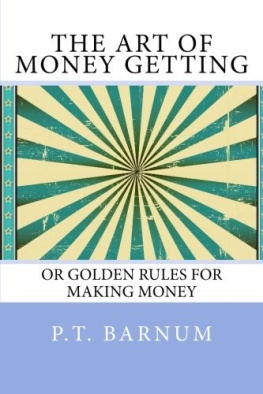Balleisen - Fraud : an American history from Barnum to Madoff
Here you can read online Balleisen - Fraud : an American history from Barnum to Madoff full text of the book (entire story) in english for free. Download pdf and epub, get meaning, cover and reviews about this ebook. year: 2017, publisher: Princeton University Press, genre: Romance novel. Description of the work, (preface) as well as reviews are available. Best literature library LitArk.com created for fans of good reading and offers a wide selection of genres:
Romance novel
Science fiction
Adventure
Detective
Science
History
Home and family
Prose
Art
Politics
Computer
Non-fiction
Religion
Business
Children
Humor
Choose a favorite category and find really read worthwhile books. Enjoy immersion in the world of imagination, feel the emotions of the characters or learn something new for yourself, make an fascinating discovery.
- Book:Fraud : an American history from Barnum to Madoff
- Author:
- Publisher:Princeton University Press
- Genre:
- Year:2017
- Rating:4 / 5
- Favourites:Add to favourites
- Your mark:
- 80
- 1
- 2
- 3
- 4
- 5
Fraud : an American history from Barnum to Madoff: summary, description and annotation
We offer to read an annotation, description, summary or preface (depends on what the author of the book "Fraud : an American history from Barnum to Madoff" wrote himself). If you haven't found the necessary information about the book — write in the comments, we will try to find it.
Balleisen: author's other books
Who wrote Fraud : an American history from Barnum to Madoff? Find out the surname, the name of the author of the book and a list of all author's works by series.
Fraud : an American history from Barnum to Madoff — read online for free the complete book (whole text) full work
Below is the text of the book, divided by pages. System saving the place of the last page read, allows you to conveniently read the book "Fraud : an American history from Barnum to Madoff" online for free, without having to search again every time where you left off. Put a bookmark, and you can go to the page where you finished reading at any time.
Font size:
Interval:
Bookmark:

Fraud

FRAUD

AN AMERICAN HISTORY FROM BARNUM TO MADOFF

Edward J. Balleisen
PRINCETON UNIVERSITY PRESS
PRINCETON AND OXFORD
Copyright 2017 by Princeton University Press
Published by Princeton University Press, 41 William Street, Princeton, New Jersey 08540
In the United Kingdom: Princeton University Press, 6 Oxford Street, Woodstock, Oxfordshire OX20 1TR
press.princeton.edu
All Rights Reserved
ISBN 978-0-691-16455-7
Library of Congress Control Number: 2016935601
British Library Cataloging-in-Publication Data is available
Jacket art: Background images courtesy of Shutterstock. Portraits illustrated by Anne Karetnikov
This book has been composed in Minion Pro text with Madrone Std display
Printed on acid-free paper.
Printed in the United States of America
10 9 8 7 6 5 4 3 2 1
For Stanley Katz,
David Brion Davis, and
Cynthia Herrup
Contents

ix |
xi |
PART I: |
PART II: |
PART III: |
PART IV: |
PART V: |
Illustrations

Figures
Table
Acknowledgments

I n recent years, I have had the good fortune to take part in several interdisciplinary collaborations on the workings and impacts of modern regulatory governance. By contrast, Fraud: An American History from Barnum to Madoff reflects a more traditional sole-authored work of history. The creation of such volumes still typically depends on the steadfast, creative contributions of many other people, as well as funds for research trips and time off from teaching. This one is no different.
Several organizations extended financial support for my research and writing. The American Council of Learned Societies provided me with a yearlong Burkhardt Fellowship that I took to the National Humanities Center, where I found good fellowship and a wonderfully conducive environment for reading and analytical thinking. I spent a delightful and productive semester at the Harvard Business School as the holder of the Thomas McCraw Fellowship in United States Business History. In addition, I enjoyed two separate leaves from the Duke History Department (one partially supported by the Hunt Family Fund), as well as small research and conference travel grants from Dukes Trinity College of Arts & Sciences.
Library and archival staff proved invaluable direction for navigating far-flung collections and the ever-burgeoning resources available digitally. I would like to single out Ellen Zazzarino and Coi Drummond-Gehrig at the Western History Department of the Denver Public Library, Janet Linde at the New York Stock Exchange Archives, Laura Lenard of Historical Collections at the Harvard Business Schools Baker Library, Eliza Robertson of the National Humanities Center, and, at Duke, Elizabeth Dunn, Lynn Eaton, Carson Holloway, Kelley Lawton, and Jacqueline Reid.
A number of current and former Duke students have furnished superb research assistance, identifying digital sources, chasing down leads, and scoping out secondary literature and archival holdings. These include former/current undergraduates Maura Freedman, Alex Hoy, Sarah Kerman, Sarah Patterson, Kate Preston, Franklin Sacha, Nick Shelburne, and Alex Wade, and former/current doctoral students Deborah Breen, Mitch Fraas, Abby Goldman, Daniel Levinson-Wilk, Christy Mobley, and Daniel Papsdorf. In the past year, doctoral student Ashton Merck has both dealt expertly with a number of issues concerning book illustrations and helped me to conceptualize what I hope will be a companion website for the book. Duke administrative staff members Jamie Hardy, Cynthia Hoglen, Carla Ivey, Robin Pridgeon, and Gloria Taylor-Neal have handled logistics deftly around RA assignments, research travel, and grants.
I have received benefit from constructive feedback during research presentations or seminars given at Oxfords Said Business School; Harvard Business School; Dukes Fuqua Business School; the New York City Market Cultures group; the University of Pennsylvania Economic History Workshop; the Bairoch Institute for Economic History at the University of Geneva; Dukes Economic Sociology Workshop; Dukes Sanford School of Public Policy; the University of Chicago Law School; the University of British Columbia Law School; Duke Law School; the University of Minnesota Legal History Workshop; the Triangle Legal History Seminar; the Max Planck Institute for European Legal History in Frankfurt; the German Historical Institute in Washington, DC; Sorbonne UniversityParis 3; and annual meetings of the American Society for Legal History, the Business History Conference, the European Business History Association, the Policy History Conference, and the American Council of Learned Societies. I am especially grateful to Dukes Kenan Institute for Ethics, led by Noah Pickus and Suzanne Shanahan, which funded a crucial daylong workshop on the entire manuscript early in 2015, and to Walter Sinnott-Armstrong and Amber Diaz Pearson, who organized that event.
Many individuals helped me develop a workable approach to a sprawling topic, suggested useful scholarship, and/or commented on chapter drafts. Close to home, I have counted on my Duke History colleagues Sally Deutsch, Laura Edwards, Margaret Humphreys, Reeve Huston, Gunther Peck, Alex Roland, and Phil Stern; a slew of other Duke faculty, such as Dan Ariely, Lawrence Baxter, Sara Sun Beale, Rachel Brewster, Sam Buell, Tim Buthe, Guy Charles, Ronnie Chatterjie, Wes Cohen, Deborah DeMott, Gary Gereffi, Kieran Healy, Lisa Keister, Kim Krawiec, Fritz Mayer, Ralf Michaels, Wayne Norman, Dirk Philipsen, Jed Purdy, Arti Rai, Barak Richman, Martin Ruef, Steve Schwarcz, Sim Sitkin, and Pate Skene; and current or former graduate students Fahad Bishara, Elizabeth Brake, Deborah Breen, Tom Cinq-Mars, Mercy DeMenno, Jon Free, Abby Goldman, Will Goldsmith, Anna Johns, Dan Levinson-Wilk, Ashton Merck, Andrew Ruoss, and Shana Starobin.
Within the broader Research Triangle, my interlocutors/readers/critics included Kevin Anderson, Tom Birkland, Al Brophy, Mary Beth Chopas, Tony Freyer, Geoffrey Harpham, Melissa Jacoby, Julia Rudolph, Benjamin Waterhouse, and David Zonderman. Among those further afield, I am indebted to Peter Baum, Hartmut Berghoff, Susanna Blumenthal, Holly Brewer, Fabrizio Cafaggi, Dan Carpenter, Cary Coglianese, Jonathan Coopersmith, Marc Eisner, Neil Fligstein, Patrick Fridenson, Christy Ford, Robert Gordon, Joanna Grisinger, Per Hansen, Will Hausman, Roger Horowitz, Robert Horwitz, Richard John, Geoffrey Jones, Pam Laird, Naomi Lamoreaux, Marc Levinson, Jonathan Levy, Stephen Mihm, Brad Miller, Sharon Murphy, Bill Novak, Saule Omarova, Julia Ott, Lynne Paine, Dan Raff, Mark Rose, Malcolm Salter, Laura Phillips Sawyer, Phil Scranton, Dick Sylla, James Taylor, Steve Usselman, Sean Vanatta, Dick Vietor, Dan Wadhwani, Elizabeth Warren, Barbara Welke, Mark Wilson, JoAnne Yates, and Christine Zumello.
Next pageFont size:
Interval:
Bookmark:
Similar books «Fraud : an American history from Barnum to Madoff»
Look at similar books to Fraud : an American history from Barnum to Madoff. We have selected literature similar in name and meaning in the hope of providing readers with more options to find new, interesting, not yet read works.
Discussion, reviews of the book Fraud : an American history from Barnum to Madoff and just readers' own opinions. Leave your comments, write what you think about the work, its meaning or the main characters. Specify what exactly you liked and what you didn't like, and why you think so.

